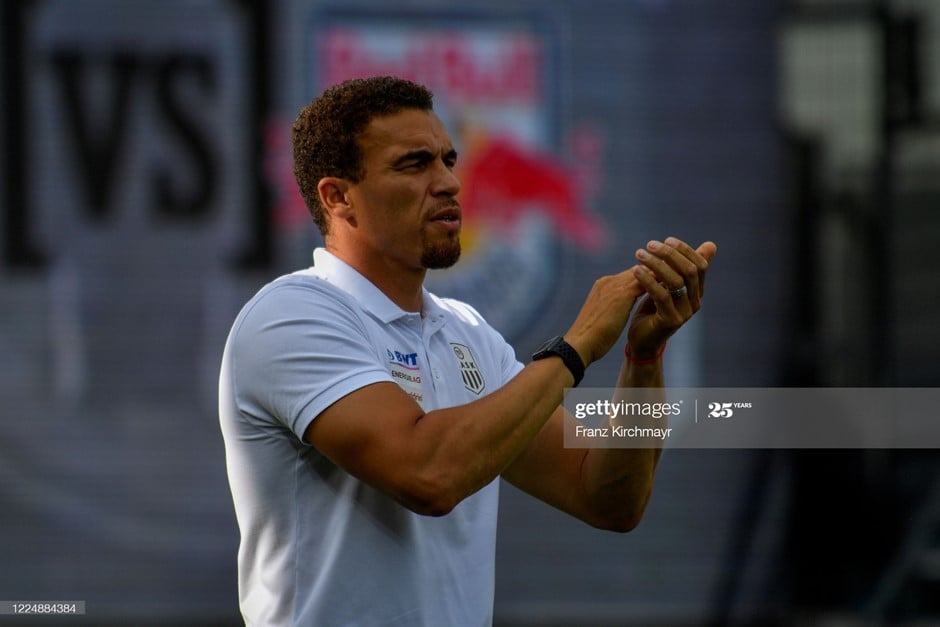Barnsley have looked abroad yet again for their new head coach, appointing the French former Wolfsburg and LASK Linz boss Valerien Ismael.
After the previous appointments of Jose Morais, Daniel Stendel and Gerhard Struber, Reds fans could be forgiven for again reaching for the internet to find out more about the new man in charge of the club.
Ismael did have a notable playing career, with Crystal Palace breaking their transfer record to sign him in 1998, and he later won the Bundesliga with both Werder Bremen and Bayern Munich.
Here’s everything you need to know about the Championship’s newest boss…
Trophy-laden career
Ismael was not short on silverware by the end of his playing days, having twice claimed league-and-cup doubles in Germany after winning three domestic cups in France and the Intertoto Cup with his hometown club Strasbourg.
That was where the centre-back began his career, progressing through the youth system before making his debut in January 1994 as an 18-year-old. There he featured in a talented team that tasted success in Europe through the Intertoto Cup in 1995 before winning the Coupe de la Ligue two years later, leading to a UEFA Cup run in which Strasbourg eliminated Rangers and Liverpool.
That gave wide attention to their talents including Ismael, who moved to England soon after in January 1998. Steve Coppell paid a club-record fee of £2.75m to bring him to Palace but he couldn’t prevent their relegation, as they finished bottom of the Premier League behind Barnsley.
After only 13 appearances Ismael returned to his native France with Lens, who had just won a league-and-cup double, and enjoyed further success with the Coupe de la Ligue in his first season and a run to the semi-finals of the UEFA Cup in his next.
He returned to his old side Strasbourg on loan in 2000-01, unable to prevent their relegation, but returned to top form for Lens the following season as they missed out on the Ligue 1 title to Lyon by just two points. His hometown club came calling again in 2002 and he joined permanently, becoming captain, but he was too good for mid-table in the French division and that’s when he made the move to Germany.
Ismael initially joined Werder Bremen on loan for 2003-04, winning his first double in an exceptional season in which he played a vital role, and he repeated the feat in his first season at the Allianz Arena with Bayern two years later after an €8.5m move.
Despite his success full international honours never came along, with Ismael unable to force his way into the reckoning of a talented France team in that period. He even tried to represent Germany at one stage but could not gain permission.
Injuries ended his time at Bayern after that one fruitful season and he moved to Hannover, but he continued to struggle for fitness and finally retired in 2009.
Mixed results
Hannover kept Ismael around after his retirement, giving him a place in the backroom team as he prepared to take the step into coaching.
In late 2011 he took charge of their second team and improved their position in the German fourth tier over almost two seasons in charge, before swapping for Wolfsburg II in the same Regionalliga Nord division, topping the table but losing the promotion play-off.
The summer of 2014 brought Ismael his first senior coaching role, but it was not to be a great success. Nurnburg appointed him following their relegation from the Bundesliga, but he lost eight of his 14 matches and had been sacked by November.
He headed back to Wolfsburg, taking charge of the second team again in 2015-16 and experiencing a repeat of two years prior; topping the table, but losing the play-off. But a big break would come when Dieter Hecking was sacked as first-team boss in October 2016, with Ismael doing enough in four games as interim coach to get the full-time job with the Bundesliga giants.
He was unable to turn the form of the struggling side around though, and they were still perilously close to the relegation zone when he was dismissed after less than four months.
Ismael’s next job would last even shorter; he took charge of Greek top flight side Apollon Smymis in the summer of 2018, but departed after only one match alleging the club’s president had tried to influence his team selection.
Next came Austria, and a spell in charge of LASK last season that put him back on the map. Particularly eye-catching were their exploits in Europe; after narrowly failing to make it into the Champions League group stage, Ismael led them to a double over Rosenborg and wins over both Sporting Lisbon and PSV to reach the Europa League knockout rounds, where they added AZ to their list of victims before facing Manchester United.
They were just as successful in the league before Covid-19 suspended the season, losing only two of 22 matches to sit top of the table. When football resumed, however, they were caught in controversy with Ismael holding team training sessions against the coronavirus regulations at the time. They were docked points but failed to recapture their form anyway, and that combination led to his dismissal at the end of the season.
Managerial style
As with previous appointments, Barnsley have looked for a head coach who will fit their ideas about style of play and be willing to work with a very young squad.
Ismael has the experience of developing young players at Hannover II and Wolfsburg II, finishing top of the league twice with the latter coming up against many much older teams, and his time with Die Wolfe will undoubtedly have played a big part in the decision in South Yorkshire to hire him.
The style and philosophy will also have been non-negotiable when they made their search, and Ismael has ticked the required boxes there too.
Part of the German school now achieving supremacy across much of European football, Ismael showed the style at LASK that he will want to transfer to Barnsley, having continued many of the principles at the Austrian club after taking over from the successful Wolfsburg-bound Oliver Glasner.
They rose from the second division to Europe by playing high-tempo, energetic football with intense pressing, and Ismael progressed that at another level with their high-profile scalps in the Europa League.
He also did that maintaining their 3-4-3 formation, a match for Barnsley’s under Struber, and he is likely to stick by the system that the Tykes players already know well and used with success in their battle against the drop.
Yet again Barnsley have taken the methodological approach to finding the ideal new head coach, and there are plenty of reasons for fans to be optimistic Ismael can be a success.










































